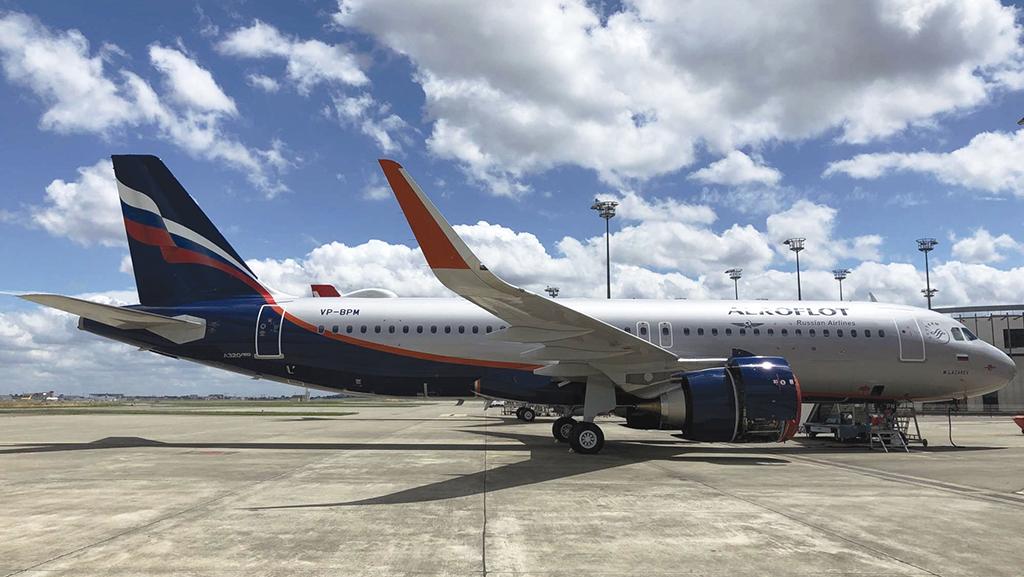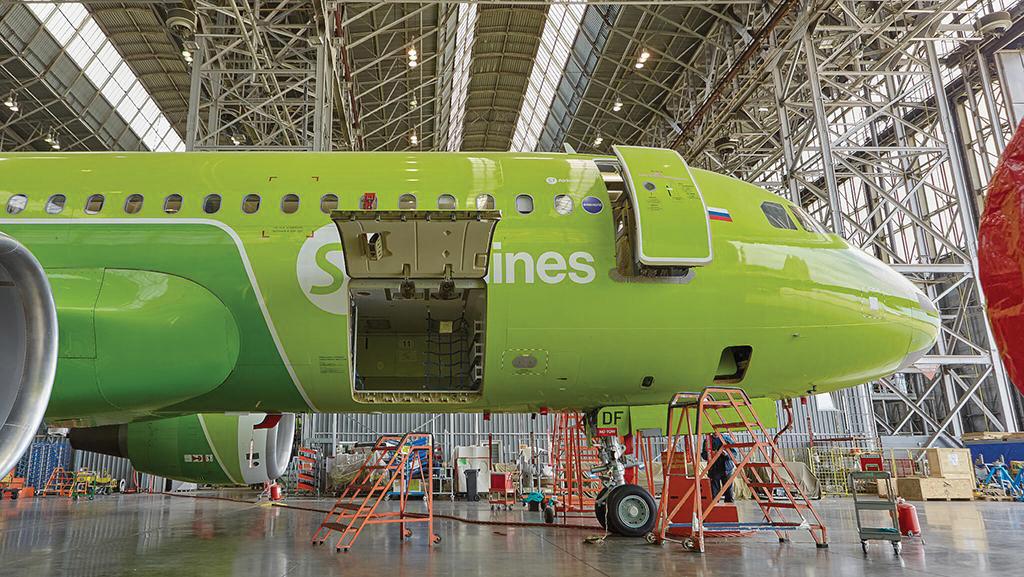
When Russia’s invasion of Ukraine started on Feb. 24, Western governments swiftly introduced a raft of economic sanctions against Moscow. These had ramifications for the aviation industry, with Russian carriers banned from flying into the airspace of countries including the U.S., UK, Canada and the European Union (EU). Sanctions imposed by 40 nations also had an impact on aircraft leasing, the export of new aircraft and the supply of components.
Over the next month, in accordance with sanctions, Western aerospace companies halted their Russian operations. Airframe manufacturer Boeing suspended support of Russian airlines operating its products. This included the sale of spare parts and the provision of engineering services. In total, Aviation Week’s Commercial Fleet Discovery database estimated in March that this would affect around 369 Boeing aircraft in the Russian fleet. Rival airframe maker Airbus followed suit and, according to Fleet Discovery, had an estimated 350 aircraft operated by Russian carriers at the time sanctions took effect. Engineering services provided by its Russia-based Airbus Engineering Center were also suspended. Engine manufacturers GE Aviation and Rolls-Royce also curtailed services in Russia.
In the long term, the West’s move away from Russia could have its biggest impact on the supply chain, and specifically on how titanium is sourced, as Russia supplies around 40% of the industry’s needs. “Pratt and GE have largely avoided using Russian titanium, but Safran and Rolls-Royce do use Russian titanium and are going to have to find alternative sources [for] that,” Kevin Michaels, managing director of consulting firm AeroDynamic Advisory, said during a panel discussion at Aviation Week’s MRO Americas event in Dallas in late April.
Fellow panelist Ronald Epstein, managing director of aerospace and defense at BofA Global Research, points to companies such as Raytheon Technologies, parent company of Pratt & Whitney and Collins Aerospace, indicating its intention to source titanium outside of Russia permanently. “That’s a major shift in the supply chain, which will come with some disruption,” he said. “That’s something we’re expecting to hear more of as more companies report this quarter.”
This self-imposed embargo could also affect landing gear production, and specialists like Liebherr-Aerospace. “We source a lot of material and product from Russia,” says Alex Vlielander, chief services officer at Liebherr-Aerospace & Transportation. The company employs 2,500 staff across the group in Russia, with 200 of those specifically working in aerospace, providing support for Russian carriers with Liebherr products. As a result of sanctions, Vlielander says Liebherr is unable to utilize that workforce for their intended jobs. “We can’t even provide technical support to the airlines. . . . If they call one of our field service reps, they are not allowed to give them any type of technical information or continue their work, so it’s a pretty impactful phase for us,” he adds.
In the face of a shrinking commercial aviation sector and reduced access to parts and MRO services, Russia has stated its intention to look toward Asia and source parts and materials for Boeing and Airbus aircraft from countries like China, India and Turkey, which have yet to go along with sanctions imposed by the West. However, any potential aerospace alliance with China remains uncertain after it reportedly refused aircraft parts deliveries in the wake of the invasion.
Impact On MRO Providers
Aviation Week’s Fleet & MRO Forecast values Russia’s MRO industry for Western-built airframes and engines at $2.3 billion for this year, which represents a steady flow of work for aftermarket specialists. In the immediate aftermath of sanctions, MRO providers, particularly in Central and Eastern Europe, saw some level of disruption to their business, mostly in line maintenance services due to cross-border flight restrictions. As EU member states, they were obligated to stop accepting any new orders from Russian airlines as of Feb. 24. For providers like Estonia-based Magnetic MRO, the financial impact was minimal; CEO Risto Maeots estimates its percentage of Russia-related aftermarket work was in single digits in 2021, at around 7%.

Meanwhile, Czech Airlines Technics (CSAT) saw only a “slight” impact from the sanctions and the situation in Ukraine on its operations. “Russian air carriers have been historically minor clients, and we have been providing them mainly with line maintenance services,” a CSAT representative told Inside MRO, adding that “due to the sanctions, it is not possible to provide the service anymore.” Poland’s LOT Aircraft Maintenance Services (Lotams) stated that it had seen little in the way of disruption to maintenance services since the outbreak of war.
Companies with larger customer exposure in Russia experienced a more sizable impact almost immediately. German MRO giant Lufthansa Technik held contracts with about a dozen airlines in Russia up to the point of sanctions being imposed, while also operating its Lufthansa Technik Vostok Services subsidiary in Moscow. The suspension of services affected about 400 aircraft in total, mainly comprising component and engine services.
Lithuania-based FL Technics has a greater volume of Russian and Ukrainian aftermarket work and saw a direct impact in the early stages of the invasion. “Since Feb. 24 and the outbreak of war in Ukraine, there have been interruptions as a result; however, these have calmed to some degree over the past few weeks,” Zilvinas Lapinskas, CEO of FL Technics, told Aviation Week in mid-April. “Russia and Ukraine are both quite important markets for us in terms of revenue—the planned revenue was around 10% from those two countries for the year 2022. Our airline customers from both countries numbered up to 20 carriers.”
Domestically, Russia’s aviation regulator granted several MRO providers new certifications throughout March. These included Yakutia Airlines adding Boeing 737 line maintenance, Aeroflot’s maintenance subsidiary A-Technics being granted line and periodic repair services for Russian-registered Boeing and Airbus aircraft, and Rossiya expanding its MRO certificate to include services for aircraft built by both of the airframe manufacturing giants.
Lessors Face Uncertainty
Unlike many MROs, lessors have been more adversely affected by the sanctions, with many leased aircraft still within Russian borders. In the wake of sanctions, lessors moved to repossess their aircraft, but efforts to do so have met with mixed success. As a result, many have taken substantial financial hits as Russian carriers took advantage of a new national law permitting them to reregister foreign aircraft as their own property under Russian registry.
The Russian commercial fleet is estimated at nearly 1,000 aircraft, according to Aviation Week data, with around half of that being leased. Aircraft manufactured by Airbus and Boeing number around 700, with an estimated 95% of that Western-built fleet being on lease. Up to late April, Aviation Week analysis shows approximately 222 commercial and business aircraft had been seized by Russian operators. These include Airbus A320ceos (73), Boeing 737NGs (64) and 25 widebodies.
AerCap, the world’s largest aircraft leasing company, filed a $3.5 billion insurance claim for its stranded aircraft in March. That same month, it disclosed that it had 135 owned aircraft and 14 engines remaining in Russia, having successfully recovered 22 aircraft and three engines. Meanwhile, U.S.-based lessor Air Lease Corp. says it will write off around $800 million of assets in Russia, consisting of 21 owned and six managed aircraft, while Irish lessor Avolon confirmed just 10 of its owned aircraft were in Russia as of the end of March.
The woes of lessors have extended outside of the U.S. and Europe. Dubai Aerospace Enterprise (DAE) revealed in early May that it had written off more than $500 million of assets in the form of aircraft leased to Russian carriers. Company CEO Firoz Tarapore said DAE had filed claims of $1 billion under certain insurance policies and anticipated filing additional claims to recover payments owed to the company.





